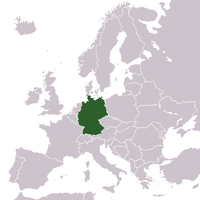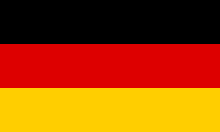Germany

Germany is a large country in northern and central Europe. It shares borders with Denmark, Poland, Czech Republic, Switzerland, Austria, Luxembourg, France, Netherlands and Belgium. The capital city is Berlin. Other big cities are Munich, Hamburg and Cologne. Germany has been part of the European Union since it began and uses the Euro as its currency.
Germany's History
[edit | edit source]In ancient times, several German tribes inhabited much of the land of modern Germany.
During the Roman Empire's expansion under Julius Caesar and others that followed him, much of the western and southern part of current day Germany was occupied by the Romans. This very much displeased them and, after being also attacked by Huns from the east, they pretty much invaded the Roman Empire up to Rome to flea from them. This was a primary cause in the downfall of the Roman Empire, and the subsequent Dark Ages of Europe.

Roman Empire — This empire stretched over much of Europe and north Africa around 2000 years ago

By the beginning of the medieval times time Germany consisted of a number of small tribal states. In the beginning of the 8th century an attempt was made by Charlemagne (a name derived from Latin, meaning "Charles the Great"), a king of a great German tribe called the Franks, to unite them.
After Charlemagne's death in 814, following German customs of those times, his land was divided up to his three sons. Modern day Germany became a part of the Holy Roman Empire of the German nation, that contained much of central Europe (with the exception of France).
Although events reduced the size of this Empire, it destruction only came in 1806/07 after being overrun by Napoleon Bonaparte's forces from France.
After Napoleon's defeat, in the next decades Germany was first united in a loose German Custom Union, (a loose connection of states that maintained some autonomy, or self-rule). Prussia, one of the largest of these states managed to unify the majority of the German states in the Northern German Confederation, a far stronger union, as well as limiting foreign influence on other German states from outside powers.
In 1871, the entirety of Germany was finally unified in a land that stretched from the boarders of modern day France to the boarders of modern day Russia. This was one of the "Central Powers" of World War I that started and eventually lost the war. Germany, being a loser in this war, was forced to sign the Treaty of Versailles, thus giving much of its land away to France, Poland and Russia. The treaty also limited Germany's influence on world affairs significantly, and fines placed on them by the allied brought their economy to near ruin.

German dissatisfaction with the treaty, and economic crisis made it easy for Adolf Hitler to promote his extreme form of Nationalism, leading to his rise in 1933.
Initially, perusing the goal of 'unification' of the German peoples, Hitler first made alliances with Austria. In 1938, he occupied the Sudetenland, a region of Czechoslovakia, and despite an agreement with other powers such as Britan later occupied the whole of that country. In 1939 the German invasion of Poland, began World War II in Europe.
After World War II, Germany was a ruin, and despite initial hopes at the Potsdam conference, quickly became divided by the opposing ideals of America (and the Allied powers) and Soviet Union.
For at least 4 decades, Germany was divided. Those in East living under an increasingly strained Communist regime (see the page about East Germany). Those in the West assisted by American aid,produced an economic miracle and where amongst the founder members of the European Union.
German re-unification came in 1990 as a consequence of dissatisfaction in the east with the increasingly brutal regime. In 1989 the Berlin Wall, which had since the 1960s divided the former capital Berlin, had fallen.

Berlin Wall — After World War 2 a large wall was built dividing Communist East Berlin from Capitalist West Berlin. It was finally dismantled in 1989
Germany's Geography
[edit | edit source]The country of Germany covers an area of 357,021 km2 (137,847 sq mi), consisting of 349,223 km2 (134,836 sq mi) of land and 7,798 km2 (3,011 sq mi) of water. It is the seventh largest country by area in Europe and the 63rd largest country in the world. Because of its central location, Germany shares borders with more European countries than any other country on the continent. Its neighbours are Denmark in the north, Poland and the Czech Republic in the east, Austria and Switzerland in the south, France and Luxembourg in the south-west and Belgium and the Netherlands in the north-west. The highest mountain in Germany is Zugspitze at 2,962 metres.

Germany's People
[edit | edit source]Germany is a country of about 84 million people, the majority of whom speak German as their first language. Germany is the EU's largest country.
Christianity is the largest practiced religion in Germany with 64% of the population who practice it. The second largest religion is Islam with 4% of the population. Other practiced religions include Buddhism, Hinduism and Judaism.
Optional kindergarten education is provided for all children between three and six years old, after which school attendance is required for at least nine years. Primary education usually lasts for four years. In contrast, secondary education includes four types of schools based on a pupil's ability as determined by teacher recommendations: the Gymnasium includes the most gifted children and prepares students for university studies and attendance lasts eight or nine years depending on the state; the Realschule has a broader range of emphasis for average students and lasts six years; the Hauptschule prepares pupils for vocational education, and the Gesamtschule or comprehensive school combines the three approaches.
Germany's Sights
[edit | edit source]
Berlin remains a very popular destination for tourists because of its night life and the history of what was two cities before 1989. Munich is visited by football and beer fans especially during Oktoberfest - the beer festival that takes place every October. Frankfurt is a major business city home to the European Central Bank and many skyscrapers.
| Wikijunior Europe • Intro • EU • Geo • People • Language • Facts • Quiz | edit | ||

